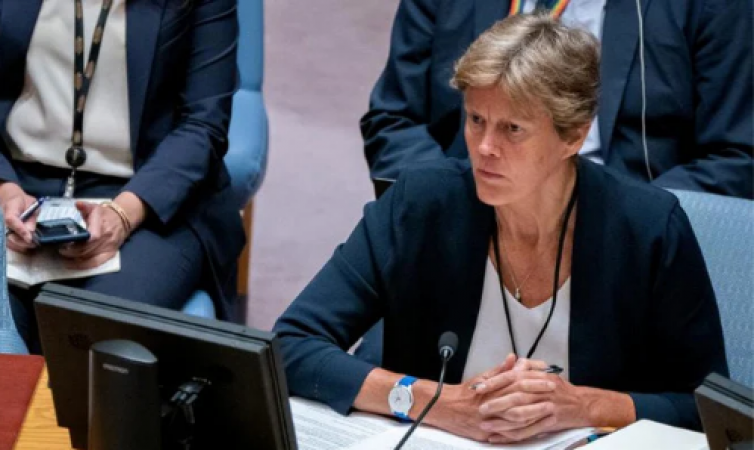
New York: The UK charged Syrian President Bashar Assad on Tuesday with replenishing his government's stockpile of chemical weapons for at least the previous five years.
The Assad regime has been actively working to rebuild its chemical weapons stockpile since at least 2018, in flagrant violation of its obligations (under) the Chemical Weapons Convention, said Britain's permanent representative to the UN, Barbara Woodward, in a statement to the Security Council.
She made her claim while the council was debating how to put Resolution 2118 into effect. It came after a recent report by the Organization for the Prohibition of Chemical Weapons, the body in charge of carrying out the CWC, which found sufficient evidence to conclude that the Syrian Arab Air Force was responsible for a chemical attack on the city of Douma in April 2018.
Also Read: Second day of fighting in Somaliland results in at least 24 deaths
Following a UN investigation that established the use of chemical weapons against civilians during an attack in a Damascus suburb, Resolution 2118 was unanimously approved in September 2013.
It outlined the sanctions that would be applied if the Syrian government failed to destroy its chemical weapons stockpiles by the middle of 2014 as per its directive. The use, development, production, acquisition, stockpiling, retention, or transfer of chemical weapons by Syria to other states or non-state actors was also prohibited.
Syria officially declared its chemical weapons programme to the OPCW in October 2013, along with a strategy for getting rid of its stockpiles.
The OPCW's Investigation and Identification Team's most recent report was presented to the council on Tuesday by Fernando Arias, director general of the organisation. According to him, there are "reasonable grounds" to think that the Syrian Arab Air Force was behind the Douma chemical attack five years ago.
Also Read: In his State of the Union address, Biden declared that the United States is 'unbowed, unbroken'
The IIT, which is tasked with locating those responsible for such attacks in Syria, came to the conclusion that two yellow canisters containing poisonous chlorine gas were dropped onto two residential buildings in the city on the evening of April 7, 2018, by at least one helicopter associated with the elite Tiger Forces division of the Syrian army.
43 identified civilians were confirmed dead as a result of the attack. The actual death toll has been estimated at 50. There were at least 100 injuries.
Arias added that now that the world is aware of the facts, it is up to the international community to take the necessary action.
The international fact-finding bodies and commissions of inquiry consistently use "reasonable grounds" as their standard of proof, and the IIT claimed that this is how it arrived at its conclusions about who the perpetrators were.
Investigators, analysts, and a number of external independent experts examined physical evidence gathered from the scene of the attack, including environmental and biomedical samples, witness statements, and other verified data such as forensic analyses and satellite images, according to the report, the team's third publication.
The Syrian Arab Air Forces are responsible for this attack, according to the IIT, which "considered a range of plausible scenarios and tested their validity against the evidence they gathered and analysed."
The US mission to the UN's under secretary for international security and arms control, Ambassador Bonnie Jenkins, also voiced concerns about Assad's attempts to revive his government's chemical weapons programme.
She told the Security Council, "It is not lost on us that many of the Syrian first responders were just a few years ago helping civilians who had been burned or suffocated by the Assad regime's chemical weapons. They are now pulling civilians from the rubble (after Monday's earthquake in neighbouring Turkiye).
According to Jenkins, the IIT has now documented five distinct instances of the Assad regime using chemical weapons. According to the most recent report, Russian forces were stationed at the base from which Assad regime helicopters launched the 2018 attack, she continued, and they and the Syrian Air Force shared control of the airspace over Douma.
The extremely troubling role played by Russian forces in blocking and delaying OPCW inspectors' access to the site after the attack has also long been noted by the United States and others, according to Jenkins.
They "also tried to sanitise the site and remove incriminating evidence of (chemical weapons) use in an effort to set up their own staged investigations."
The OPCW report "puts to rest Russia and Syria's groundless allegations that opposition forces were responsible for the Douma attack," she continued. The IIT was very clear that it didn't believe there was any validity to such a fable.
Jenkins echoed the majority of council members in calling for the attack's perpetrators to be held accountable, for the Assad regime to uphold its international commitments, and for "immediate and unrestricted" access to be granted to OPCW staff so they can continue their investigations.
Also Read: Superbug-boosting harmful pollution fuels a "silent pandemic"
The IIT report is a "hoax," according to Russia's permanent representative to the UN, who reiterated this claim. Vassily Nebenzia asserted the OPCW and IIT's work is biassed and politicised once more.
As a "staged chemical weapons attack" and a "brash falsification by the West," he called the Douma incident.